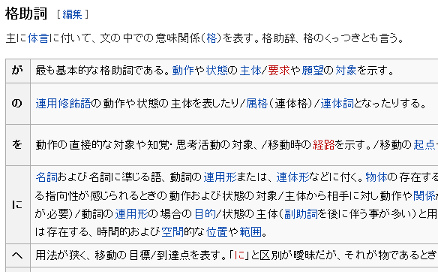When I returned from Austria, I picked up my language studies again. I mean, I did study Japanese on and off throughout the three years I have been here now, with varying success. This time I hope it will go much better: I found a teacher!
We met in the Kyoto International House, where I approached him after I saw him teaching Japanese to somebody else. He is a retired teacher of English (how cool’s that) who is now teaching Japanese to foreigners. I am glad that we have the same approach to language through grammar, so it seems like a match made in heaven.
 Already he has bombarded me with exercises for joshi – Japanese particles. Those are little, mostly one-syllable words without meaning in itself; but they are very precise indicators of grammatical structure. There is no direct equivalent in English (particles like to, from, of, by, etc. have some of the meaning of joshi) or in German (our four cases come close, but are not exhaustive), so learning them is very difficult.
Already he has bombarded me with exercises for joshi – Japanese particles. Those are little, mostly one-syllable words without meaning in itself; but they are very precise indicators of grammatical structure. There is no direct equivalent in English (particles like to, from, of, by, etc. have some of the meaning of joshi) or in German (our four cases come close, but are not exhaustive), so learning them is very difficult.
Part of the problem is that when they are exchanged, the meaning of the sentence can change completely. I keep joking that Western languages like to add words, where Japanese likes to change them:
Watashi WA nihongo o shabemas. – I speak Japanese.
Watashi MO nihongo o shabemas. – I also speak Japanese.
Or that some verbs require a particular joshi in a particular context – and the difference is not really translatable into any of the languages I speak… Anyway, my teacher says that joshi are the most important part of Japanese, and he claims that when you get them right, you can speak Japanese perfectly. Well, I am willing to try…
He does not want me to call him teacher though, instead he says “we are both studying Japanese together” which is a very nice way to put it. He says he has to carefully think about the grammar when he wants to teach it, which is exactly the way I feel about teaching German: I know how it is correct, but I really have to think about the why.
This really seems like a match made in heaven – and I’m not even religious!
